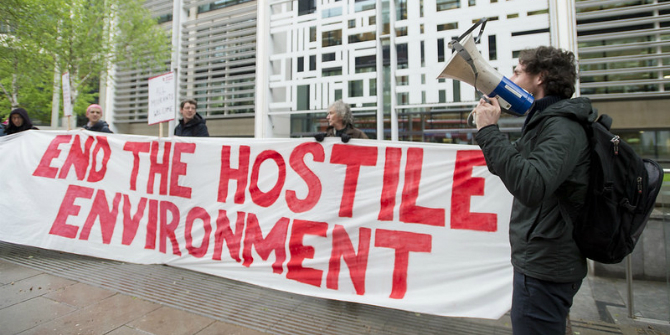“The UK’s Points-Based Immigration System” Policy Statement, published last week, presents a drastic change to immigration in the UK. Monique Hawkins, on behalf of the3million, representing EU citizens and their family members who have already made their home in the UK, offers their point of view.
The government’s proposal is ambitious. It’s difficult to ignore that some of the “language could almost have been designed to offend European residents” (h/t FreeMovement blog). Or the fact that this is not really a points-based system (PBS) anyway, rather a slight relaxation of the existing pseudo Points Based System that already inflicts such misery on applicants and sponsors, and which will now drag all EU citizens and family members down into it. It’s difficult to suppress continued fury that the reciprocity of free movement is consistently ignored. This government sees free movement only as inward migration to be stopped at any cost, rather than the consensual freedom we all had to live, work, and love in 28 different countries.
Instead, let’s focus on two very specific implications of this system and the recent Policy Statement for those EU citizens and their family members living in the UK, protected by the Withdrawal Agreement and having to apply for status under the EU Settlement Scheme.
A legal safety net?
For over three years now, the3million has been calling for the creation of a safety net by changing the legal basis of the EU Settlement Scheme to be declaratory rather than constitutive. This means that eligible people would have a legal status by virtue of primary legislation but would need to register (using the EU Settlement Scheme) in order to get the proof of that status. This proof would be required to demonstrate our rights to employers, the NHS and other service providers. The Government has pushed back against this, claiming that this would cause a repeat of the Windrush fiasco, but their arguments are demonstrably wrong.
In any case, because of the Withdrawal Agreement, there will now be a period during which there will have to be a declaratory status of sorts. Free movement will end on the 1st January 2021 (§1 of Policy Statement). However, EU citizens who are eligible for pre-settled or settled status, but have not yet applied for it by then, will nevertheless have to have a legal status. This is because the application deadline is set to 30th June 2021 (§30 of Policy Statement). The Policy Statement glosses over how this legal status will be achieved. It merely states that there will be a ‘transition measure’ – a temporary delay of the impending Hostile Environment for EU citizens during which employers, landlords and public service providers must continue to accept just passports / national identity cards of EU citizens without being allowed to ask for further proof of status.

We see several serious issues with this approach:
- This is at best confusing for employers. The very next paragraph (31 of Policy Statement) urges employers to gain approval from the Home Office now if they think they will want to sponsor skilled migrants from early 2021. These mixed messages will make it fairly inevitable that employers, landlords etc. will not heed the fine print, and will turn away eligible EU citizens who have not yet been able to secure their status.
- On the other hand, there will be EU citizens who still will not realise that they need status until it is too late – as no mass registration scheme worldwide has ever managed to reach 100% of its target audience. 1st July 2021 will be a catastrophic cliff-edge – there is no transition from not needing a status to no longer being able to obtain that status. At the exact point where employers, landlords etc can start asking for proof of status, those who were not reached in time face a complete loss of legal status.
- It is instructive to remember the (extremely successful) Digital TV switchover campaign (see p9 of this NPC report) from 2007-2012. Even though 97% of people had signed up by the eve of the switchover, 3% had clearly still not been reached, and only signed up once they faced a blank TV screen. If the same thinking behind the EU Settlement Scheme deadline had been applied to that campaign, those 3% would face a ban on ever watching TV again, and be criminalised in the process.
- We would be very impressed if the EU Settlement Scheme were to reach 97% of eligible citizens (though we could not ever know that anyway because we simply do not know how many of us there are exactly). Still, it is important to remember that the missing 3% translates to at least 100,000 individual human beings – many of them vulnerable such as children whose parents did not apply on their behalf, elderly without support, or simply less digitally literate people.
What we need instead is the assurance that once eligible citizens without status face consequences from employers etc., then they are saved by legislation which has conferred their legal status, for which they can then belatedly register to obtain proof. We need the legal safety net that was, after all, promised by Boris Johnson, Priti Patel and others in 2016 when they said we would “automatically be granted indefinite leave to remain”.
Whilst the3million is obviously pleased to see that a great number of people have already secured their status under the EU Settlement Scheme (though only a temporary status for 41% of applicants), our concern has always been, and continues to be, about those who are eligible for status but ultimately fall between the cracks and fail to obtain it.
Digital discrimination?
The policy statement makes multiple references to the fact that EU citizens will not receive any physical proof of status, and instead will be the only group of citizens who will need to use an online checking service to demonstrate their immigration status and their rights and entitlements. They must do so using their passport or identity document with which they applied to the EU Settlement Scheme. What happens if their passport is lost or stolen? Renewed and retained by the issuing authority? An inability to prove one’s status in the UK’s ‘Hostile Environment’ of delegated border control wrecks lives – as we have seen with the Windrush scandal.
There is a concerning statement “For many EU citizens, their status will automatically be available when seeking to access benefits or the NHS.” (§29 and Annex A.4 of Policy Statement). Why “many”? Why not “all”? What will happen to those whose status is not available?
In terms of crossing the border, the policy statement claims that there will be a “fully digital end to end customer journey” (§33 of Policy Statement). How will this work at foreign ports and airports? Will every check-in desk across the globe be able to access the UK’s immigration status database when trying to ascertain whether EU citizens can travel to the UK? the3million has written a letter to the Home Office asking for clarification.
It is unacceptable to use over 3 million citizens as guinea pigs in an untried and untested digital experiment, which is why the3million has been campaigning for us to receive physical proof of our status. The House of Lords (in this government’s first defeat) passed amendments to address both these major concerns; a legal safety net and physical proof of status. Given the government’s all-powerful majority, the House of Commons promptly overturned these – thereby storing up much trouble ahead for EU citizens and their families.
The Policy Statement released last week did nothing to address these issues. And that’s even before any discussion of the damage that the future immigration policy will inflict on the UK, which has been widely commented on elsewhere.
the3million urgently asks that Ministers engage with our concerns.
This post represents the views of the author and not those of the Brexit blog, nor LSE. Image by Global Justice Now, Some rights reserved.







The Home Office have clearly not thought this one through. The lack of physical proof of Settled Status or Pre-Settled Status will prove to be a nightmare. As my Non – British partner keeps reminding me, ”what happens when we go on holiday and we arrive at the check in desk to do the return leg? ”. After the transition period how will a non British person prove they have the right to travel to the UK? As we all know airlines have a legal duty to check passengers hold the required travel documents. How will they check or know? Get ready for another Home Office scandal.